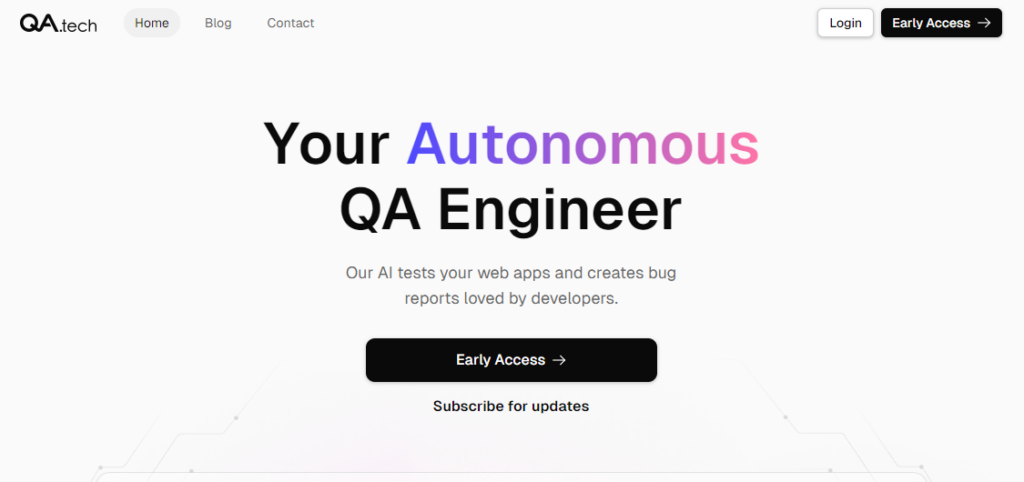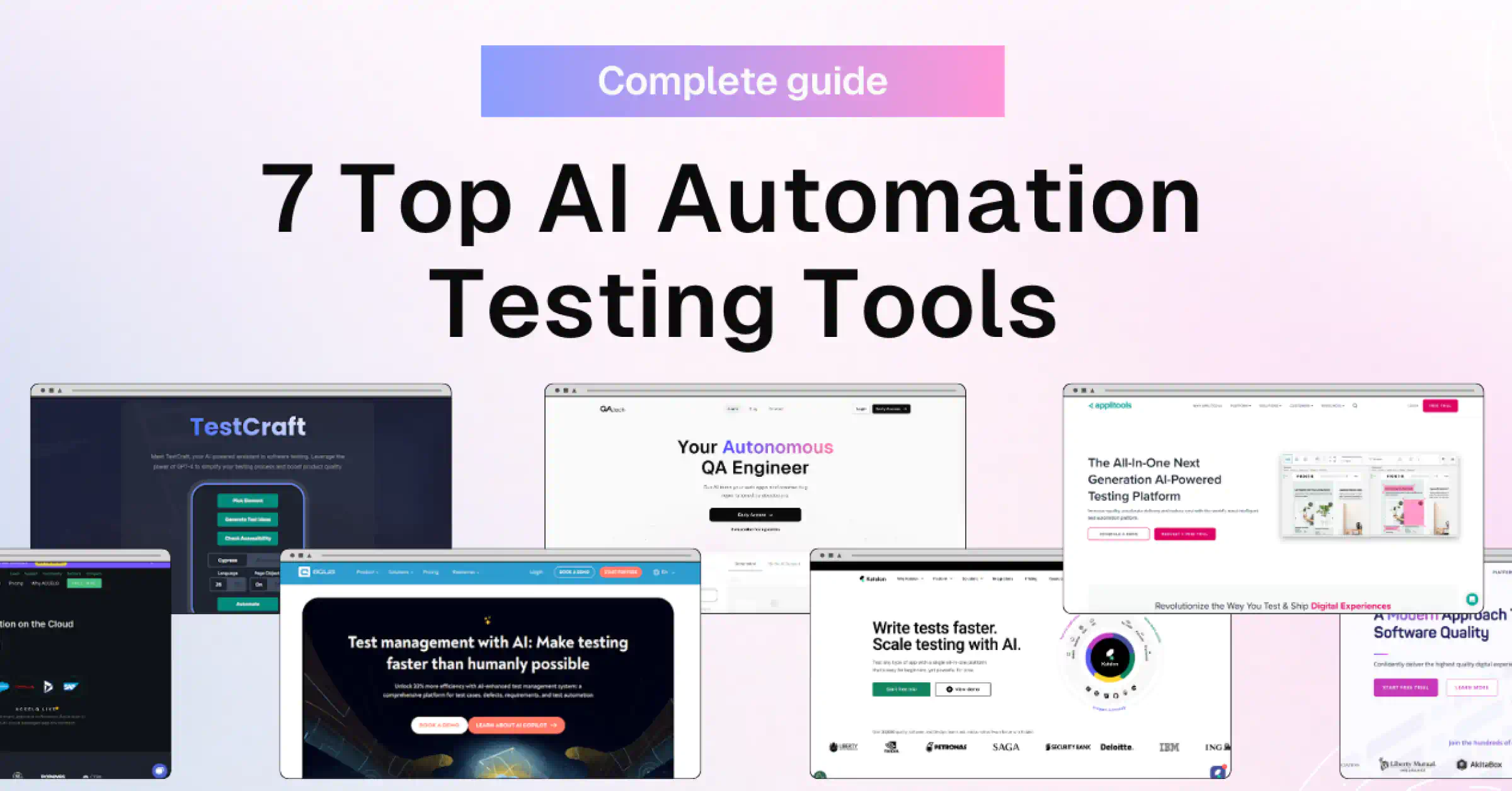AI-enabled testing is becoming expedient in software development processes for many reasons. Companies are leveraging AI in testing for more comprehensive test coverage, predictive analytics, greater efficiency and speed, enhanced accuracy, and faster time-to-market.
Artificial Intelligence, a concept for machines that could mimic simple problem-solving capabilities, has evolved into complex systems capable of learning and adaptation. Moreover, the technology is helpful worldwide, including QA testing and software development.
This article discusses AI enabled testing in detail. Read on to discover how AI has found vital use in quality assurance and software development cycles!
What Is AI?
The concept of artificial intelligence has been around for a long time, but initially, the technology influenced only a few people. With the rise of ChatGPT, AI permeated every aspect of human existence. Statista predicts that in the future (2028), AI will thoroughly affect everything we do, from transportation to communication, healthcare, software development, and more.
AI involves creating intelligent machines that simulate human cognitive abilities. Unlike basic programming that dictates a rigid set of instructions, AI allows machines to perform tasks that require advanced thinking, like data analytics, making decisions, and even learning and adapting. This grants AI systems some autonomy, making them more flexible and powerful tools.
What Is AI Testing?
AI testing is the integration of artificial intelligence tools and systems to test the performance, function, security, and usability of a software product. Although using AI tools does not change the core principles and processes of traditional testing, it enhances the processes by making software testing more accurate, faster, data-driven, and reliable.
Traditional testing combines automation and manual effort, which can slow down productivity. In conventional testing, testers use automation tools to handle repetitive tasks while focusing on other aspects of testing that require higher-level thinking and decision-making.
But with AI testing tools, QA teams can free up even more time for more strategic roles, as AI can handle the tasks that require human reasoning. Moreover, artificial intelligence testing tools can make data-driven decisions, learn and adapt, and function at an extra level of efficiency than human testers.
How to Use AI in Testing
QA testers leverage AI to scale software testing, reduce time-to-market, and improve product quality. Below are ways to use AI in software testing:
Related Posts: What Is AI in Quality Assurance and How Can It Impact Your Business
1. AI-Enabled Testing for Test Case Generation
In the past, quality assurance teams meticulously hand-crafted test cases. However, this procedure was prone to errors, tended to be slow, required multiple revisions, and generally stalled productivity levels for many businesses.
By contrast, AI can do more than simply replicate existing tests. The tools can creatively analyze your codebase, user behavior data, and historical test results to generate a fresh wave of test scenarios faster than when done manually.
What’s more, AI can identify potential edge cases, hidden interactions, and areas where user behavior might expose vulnerabilities. AI-driven tools are assistants that can discover loopholes in your software product, ensuring more comprehensive test coverage.
2. High-Quality Testing on Autopilot
Manually repeating tests can drain valuable energy. With AI, QA teams can efficiently manage testing, as AI testing tools can prioritize tests based on risk assessments or potential impact, focusing efforts on critical areas first.
As new features evolve, AI can adapt to changes in the software development process, automatically adjusting test execution to reflect the new functionalities and ensuring your tests remain relevant and up-to-date.
3. Data-Driven Insights
Artificial intelligence utilizes data to make insightful and intelligent decisions in software testing automation. By analyzing data with lightning speed, these AI tools help to identify patterns and anomalies that might escape human notice.
Additionally, AI can detect correlations between seemingly unrelated data points, helping to discover hidden issues that could have significant downstream impacts. This discovery allows you to address problems early in the development cycle, saving time and resources.
4. Self-Healing Tests
Software development is an iterative process, with frequent changes and updates in different phases of the development cycle. Typically, these changes can break existing tests, which need to be adjusted or rewritten.
By learning from past test failures and successes, AI tools can automatically adjust test cases as the code changes. This auto-healing capability ensures your tests remain relevant and reliable, reducing the need to fix tests repeatedly and keeping your regression testing process efficient.
5. Creating Attractive UI for Users
Software users can quickly decide whether they’ll use a product based on their experience with the user interface. But that shouldn’t be a persistent problem for product teams since AI can automate visual testing.
AI testing tools can critically examine every screen, layout, and element across different devices and browsers. Plus, they can detect inconsistencies in font size, color variations, or misaligned elements, ensuring a satisfactory user experience across all platforms. With AI’s support, testers can focus on the more nuanced aspects of usability testing that require human ingenuity.
How Not to Use AI in Testing
AI is a powerful tool for software testing with a few limitations. Here’s how to ensure AI augments your testing process rather than hindering it.
1. Replacing Your Entire Testing Team with AI
While AI excels at automating repetitive tasks and analyzing vast amounts of data, human testers remain irreplaceable. Areas like setting testing goals, interpreting complex results, and handling scenarios requiring real-world user simulations still need the human touch. Therefore, think of AI as a collaborator that frees testers to focus on strategic areas and creative problem-solving.
2. Your AI Tests Are as Good as Your Data
The quality of your AI tests significantly depends on the integrity of your data. If the data used to train your AI tools is insufficient or with biases, the generated test cases might be inaccurate or miss crucial areas.
Ensure your AI tool has access to a diverse and representative dataset that reflects the real-world usage of your software product. For instance, if your software targets a global audience, the training data shouldn’t be limited to a single user demographic.
3. Not Updating Your AI Tools
AI tools are not static entities, so you must continuously update your AI models to maintain their efficiency, especially as your software evolves and testing needs change. Regular updates help ensure your AI testing tools remain sharp and relevant.
4. Not Caring About How Your AI Tool Works
Don’t use an AI tool without comprehending its model of operation. Some AI testing tools can be opaque, making it difficult for testing teams to understand how they arrive at specific test results.
This lack of transparency can be problematic when you need to diagnose issues or verify the AI’s findings. That said, you should opt for AI tools that offer some level of explainability to understand the reasoning behind the AI’s recommendations.
5. AI Is Not a Software Development Panacea – Manage Your Expectations
AI is a game-changer for software testing, but it’s not a silver bullet. It can significantly improve efficiency and identify hidden issues but doesn’t guarantee perfect software. Instead, you should view AI as a powerful tool that complements your existing testing processes rather than replace human ingenuity and critical thinking.
What Are the Benefits of AI Enabled Testing?
Many software product companies use AI in testing for many reasons, including the following:
1. Better Speed and Efficiency
AI automates repetitive tasks like test case generation and execution. The technology also builds on past data, enabling it to make intelligent decisions and freeing testers for more strategic work. This significantly reduces testing time and streamlines the development process, resulting in greater efficiency and a faster time-to-market.
2. Comprehensive and Deeper Testing
AI’s analytical capabilities allow it to investigate and draw insights from large datasets, identifying patterns and anomalies quickly. Think of AI as a data detective that unravels hidden bugs and other potential issues humans might miss. This profound analytical capability leads to more comprehensive testing, ensuring a higher quality software product.
3. Reduced Manual Effort and Maintenance
Artificial intelligence’s self-healing capability is helpful when there’s a significant change in your software development cycle. Typically, software development changes would render existing tests obsolete, requiring a reworking. AI tools can automatically adjust test cases to adapt to the evolving software, eliminating the need for constant manual maintenance and keeping your testing process efficient.
Related Post: Manual, Automated, and AI QA Testing: Comparison Guide
4. Greater Accuracy and Reduced Costs
By automating repetitive tasks and catching bugs earlier in the development cycle, AI helps to minimize human error. This translates to fewer bugs reaching the end user, ultimately reducing the cost of fixing problems later in the process.
Also, with AI’s help, you can achieve a higher level of testing accuracy, reducing the need for human contribution and helping you cut back on the salaries paid to a resource-intensive quality assurance team.
5. Continuous Learning and Improved Testing
AI testing tools are constantly learning and evolving. As they analyze more data and encounter new test scenarios, they become better at identifying potential issues, making data-driven predictions, and generating more effective test cases.
This continuous learning process ensures your AI testing remains relevant and effective over time, adapting to the ever-changing software development landscape
Recommended Tools for AI in Testing
1. QA.Tech – Developer-Friendly Web App AI Testing Tool

QA.Tech is an AI tool built to automate and streamline web application testing to help businesses reduce costs and testing resources. Trained with clean and reliable data, this AI tool can improve the end user’s experience by thoroughly analyzing your website’s UI, eliminating bugs before they reach production, and providing actionable feedback for higher-level decision-making.
Benefits
- Reduced testing time and cost
- Advanced bug detection and prevention
- Actionable feedback to enhance customer satisfaction
- Incredible tips to improve UI
- Flexible pricing model
2. Katalon – Multiplatform AI Testing Tool
Katalon is a comprehensive solution for managing software quality focused on user-friendliness and scalability. This AI-enabled testing platform aims to reduce manual effort and improve testing efficiency. Katalon is easy to use for testers with varying experience levels. Plus, the platform can handle testing across different types of applications.
Benefits
- Improves software quality and user experience
- Greater testing efficiency and intelligent automation
- Easy-to-use platform
- Flexible pricing structure
3. Applitools – Visual Testing AI Tool
Applitools is an AI testing tool that ensures a consistent and visually appealing user experience. Applitools adapts to various platforms depending on a company’s needs, including on-premise, cloud-based, or Software-as-a-Service (SaaS) solutions, making it to support scalability and adaptation to diverse development environments.
Benefits
- Detects visual inconsistencies across devices and browsers to improve user experience
- Reduces manual effort and accelerates testing
- Offers flexible deployment options for different needs
- Leverages advanced AI for superior accuracy
4. Test Sigma – Comprehensive AI Testing Tool
Testsigma is a cloud-based, AI-enabled testing platform designed to simplify and enhance the software testing process on web, mobile, and API applications. This easy-to-use tool allows users to perform all their software testing in one single platform, eliminating the need to juggle between multiple tools. Additionally, the tool leverages NLP-based scriptwriting to support different users regardless of experience.
Benefits
- Testing across web, mobile, and API applications
- Flexible scripting options for diverse testers
- Data-driven testing for thorough coverage
- Insightful reporting and collaboration features
5. Functionize – High-Quality AI Testing Tool
Functionize leverages machine learning and other AI technologies to expedite and improve software testing processes significantly. This tool reduces manual tests by automating test case generation and execution. Also, Functionize integrates seamlessly with CI/CD tools, enabling smooth testing automation within the software development workflow.
Benefits
- Utilizes ML for improved test coverage and accuracy
- Offers self-healing tests for reduced maintenance
- Integrates with CI/CD for streamlined workflows
Wrapping Up
AI enabled testing is a better way to improve the speed and quality of software development. You can use AI testing tools to generate test cases and execute them. You can also use AI to detect and predict issues human testers can easily miss. Generally, AI helps increase productivity, reduce testing costs, and improve user satisfaction with your product.
Are you considering incorporating AI into your software development processes? QA.Tech is a comprehensive AI testing tool for web applications. Our autonomous tool can help you accomplish your testing goals. Please contact us to discover how we can help you!





